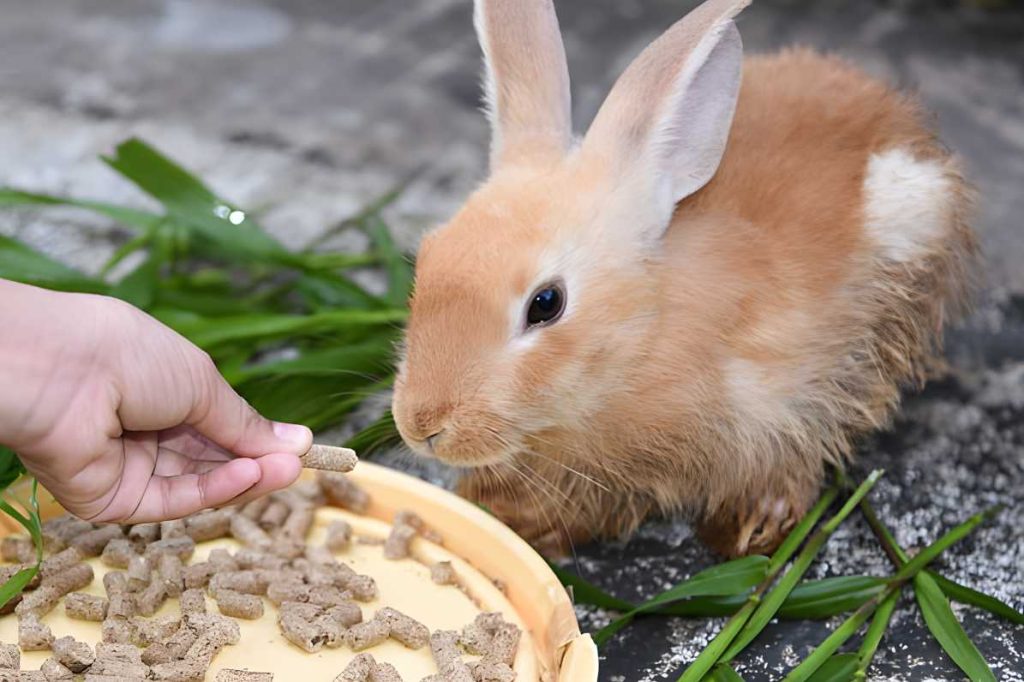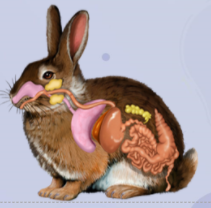How Long Can A Rabbit Go Without Eating?

A rabbit can go without eating for about 12 hours before you need to start worrying.
If you own a pet rabbit, you may have rarely seen these fluffy friends stop munching, they can spend the entire day doing this only. No matter how much you offer them, they always seem to be wanting more.
Has it happened that you served your rabbit its favorite greens and pellets for supper, but somehow it doesn’t seem very eager to consume them? Or has it happened that it’s not eating at all suddenly?
While it can be your picky bunny refusing to eat what is served, it can also be something you should be worried about. Wondering how long a rabbit can go without eating? Or how to make them eat again?
Get your queries answered here! Keep reading to find out.
How Long Can A Rabbit Go Without Eating?
A rabbit should not be allowed to go more than 12 hours without food to be safe; otherwise, it runs the risk of developing GI stasis, a life-threatening medical condition. And it should have constant access to fresh clean water 24/7 nevertheless.
If your rabbit has stopped eating suddenly and you’re wondering how long it can survive, know that adult rabbits in good health can go up to 3-4 days without eating. As time passes, they’ll slowly start to develop illnesses from starvation and malnutrition, and even die too.
As for the young or underweight ones, they may not even survive the day without eating.
What Is Gastrointestinal (GI) Stasis?

GI Stasis is a medical condition that is caused when the digestive system of your rabbit slows down or completely stops. The stomach muscles and intestine contract during this time, and the bacteria count in the digestive system increases. The bacteria may discharge toxins into the body, stressing the liver and possibly leading to organ failure.
Rabbits having GI stasis may show signs gradually or suddenly. They may:
- Eat less or completely stop eating
- Show signs of pain such as teeth grinding
- become lethargic very rapidly
- The stomach may look bloated
- They may initially pass out soft stool or diarrhea, which will be small and dry, or can even stop.
Serious cases of GI stasis can be lethal if untreated.
What Foods Should Rabbits Have Around The Clock?
Bunnies need to feed frequently throughout the day to maintain an active and functional digestive system, their gut is accustomed to receiving food on a constant basis. Here’s what food they should have.
- 80% Hay:
Fresh grass or hay (dry grass) should be the major food source for any rabbit. The single most crucial factor in preserving healthy oral and digestive health is its high fiber content. A pile of hay (orchard hay, timothy hay, oat hay, meadow hay, etc.) the size of a rabbit’s body should be consumed daily by rabbits if not more.
- 12-15% Vegetables and Leafy Greens:
Carrots or lettuce alone are insufficient inclusion in the diet of your bunny. Actually, only 25% of your rabbit’s vegetable diet should have root veggies. The rest 75% needs to be fresh, dark leafy greens like kale, parsley, dandelion greens, broccoli leaves, collard greens, and so on.
These should also be provided daily at a rate of roughly 1 cup per 5 pounds of body weight. To increase the water consumption of your rabbit, you can soak the leafy greens in a water dish.
- 4-6 % Pellets:
Pellets aren’t a necessary part of a rabbit’s daily diet. Feeding a non-pelleted diet is doable, but you need to carefully balance the diet with nutrient supplies from various types of vegetables and hay.
A pet rabbit of 6-10 pounds only needs about 1/4 cup of pellets a day. And feed it no more than 1/8 of a cup if it weighs under 5 pounds. Make sure they are hay-based plain pellets (preferably timothy hay) without any pieces of dried fruits in them
- 1-2% Treats
The best kinds of treats for your rabbit are fresh fruits like apples and pears without seeds, bananas, mangoes, etc. but they are really strictly recommended. The amount of treats you should feed your rabbit 2-3 times a week is about 1-2 tbsp per 5-pound body weight.
What To Do If Your Rabbit Hasn’t Eaten For Quite Some Hours?
You may have noticed your rabbit munching almost throughout the time they are awake. This is so that their digestive systems may continue to function properly and maintain regular bowel motions. They can become critically ill very rapidly if they don’t eat continuously.
What you can do
- Your rabbit should be taken to a veterinarian right away if they notice that they haven’t eaten in more than 10-12 hours and are exhibiting other clear indicators of GI Stasis. If they are not exhibiting any GI Stasis symptoms, a veteran physician will be able to determine whether it is dental disease, chronic anxiety, or any other cases.
In the absence of obvious signs of GI Stasis, you may try the following things in the first few hours:
- Try giving your rabbit a different type of hay from the one it usually consumes. If you generally give him Timothy Hay, try giving him oat hay to see if it encourages him to munch.
- Force-feed your bunny with mixed-veg baby food with a syringe to stimulate its digestive system. Support your pet to exercise and massage its stomach after forcing food into it to promote gut motility
- To offer more hydration, increase your rabbit’s water intake.
- Make an immediate visit to the veterinarian if your rabbit continues to refuse food and water.
Final Thoughts
Now you know that your bunnies need to be fed around the clock with hay, and twice a day with other essential items of the diet. So, if somehow you are under the circumstance that you can’t be at home for a long time, make sure there’s someone to feed these babies at least once a day, be it your close friends or neighbors.
Hope you found this article interesting. To know more, you may check on the related articles about your rabbit’s health and diet
